Can You Take HRT for the Rest of Your Life?
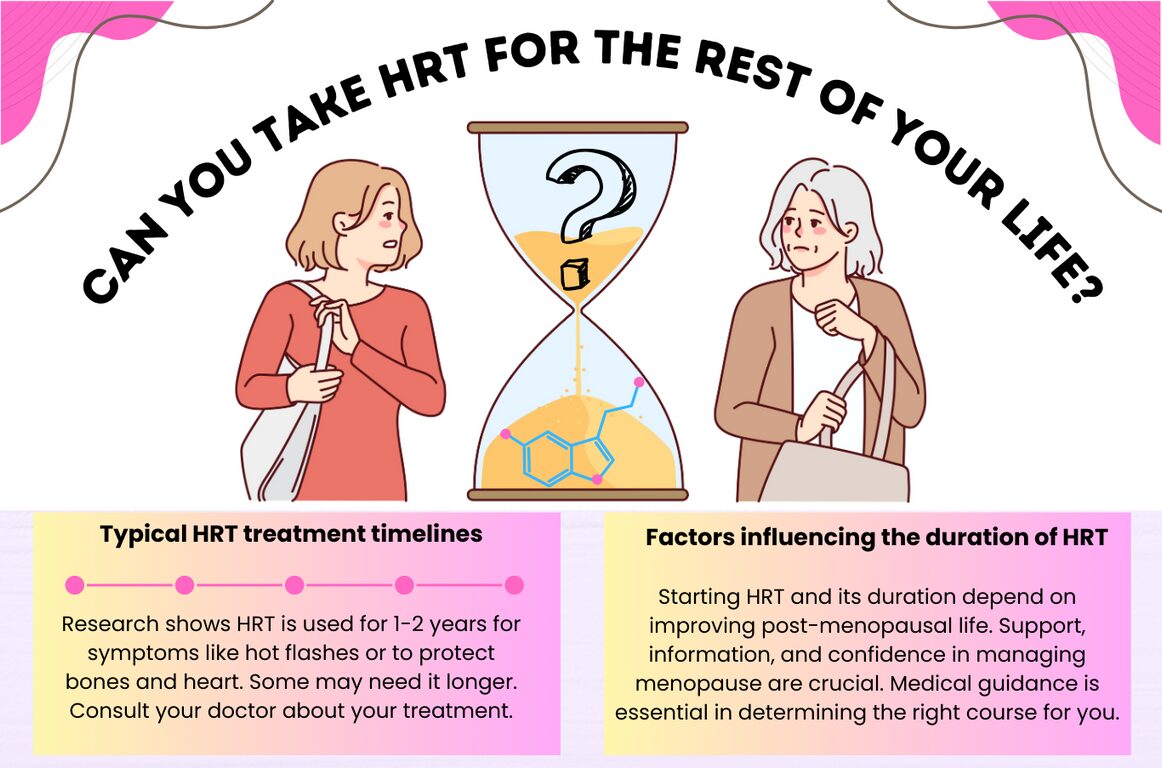
Thinking about hormone replacement therapy (HRT) and if it’s something you can do for a very long time, or even all your life? It’s a big question for many. HRT helps lots of people by balancing hormones, making them feel better, especially during times like menopause. Whether you can stay on HRT forever depends on your own health and what you need. Medical experts recommend checking how HRT is working for you and looking at any risks. There’s no set end date for using HRT. This article will help you understand more about staying on HRT for a long time, the good things it can do, and the risks to keep in mind.
Duration of HRT: Short-term vs. Long-term Use
It’s important to know how long you might need HRT. Is it for a short while, or longer?
Typical HRT treatment timelines
A study found that people usually use HRT for about 1 to 2 years to help with symptoms like hot flashes or to protect their bones and heart. But, some might need it for 3 to 5 years. There’s no strict rule on how long you can be on HRT, but it’s a good idea to check in with your medical professional about your treatment.
Factors influencing the duration of HRT
Choosing to start HRT and how long to take it can really depend on making your life better after menopause. More support, better info, and believing you can handle menopause can help. Medical professionals play a big part in figuring out what’s best for you.
Can You Take HRT for the Rest of Your Life?
You can use HRT safely for about two to five years. But, a 2017 study showed that using HRT for up to seven years does not increase the risk of death. We don’t know much about using HRT for more than seven years. So, it’s important to talk with your doctor often. They will consider your health now, your past health, and your family’s health too.
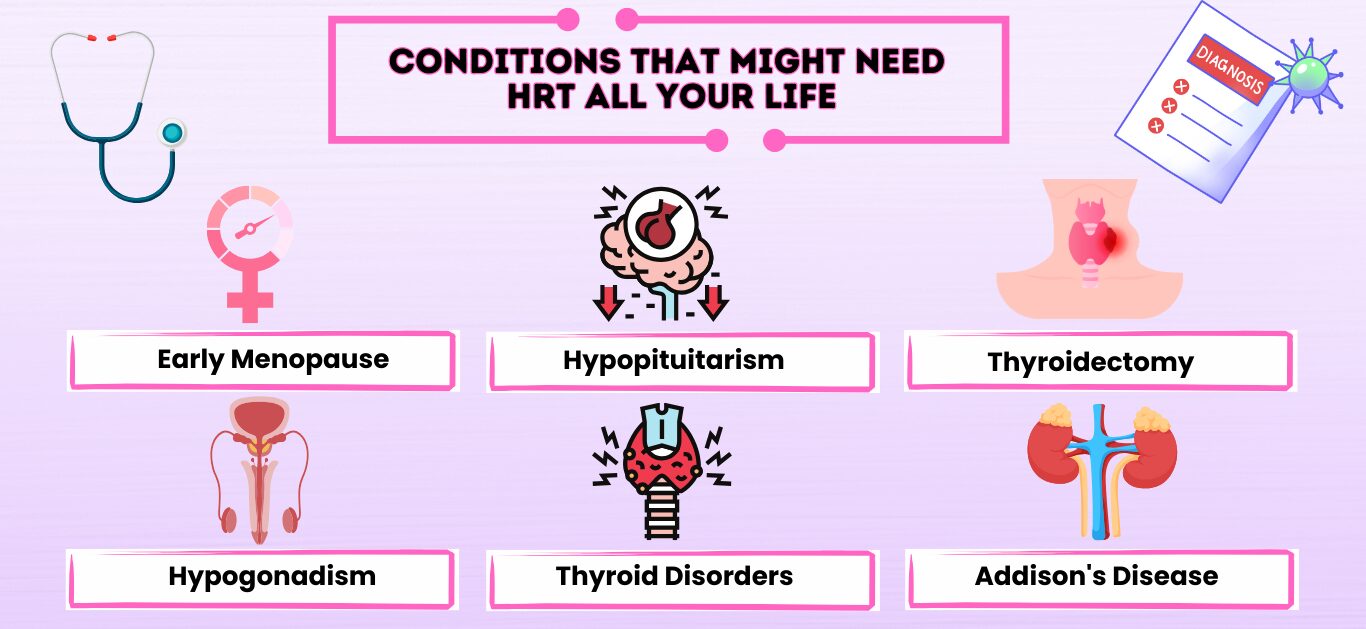
Conditions That Might Need HRT All Your Life
Some health issues mean you might need to take hormone replacement therapy (HRT) for a long time, maybe even forever. Let’s look at these conditions:
1. Early Menopause
If menopause happens before the age of 45, it’s called early menopause. This can make you feel hot flashes, change your mood quickly, and might make your bones weaker. HRT gives back the hormones your body stopped making too soon, helping you feel better and keep your bones strong.
2. Hypogonadism
This is when the body doesn’t make enough sex hormones. For women, it might mess with their periods and for men, it can lead to less muscle and weaker bones. HRT helps by adding the hormones your body is missing, helping things go back to normal.
3. Hypopituitarism
This happens when a tiny gland in your brain, called the pituitary gland, isn’t doing its job right. This gland tells other parts of your body how to make hormones, so when it’s not working, you might not have enough of several important hormones. HRT can help get these hormone levels back on track.
4. Thyroid Disorders
Your thyroid is a small gland in your neck that helps control how fast or slow your body works. If it’s not making enough hormones, you might feel tired, gain weight, and feel colder than usual. People with thyroid problems often take medicine to help their body work like it should.
5. Thyroidectomy
This is a surgery to remove all or part of your thyroid gland. After this surgery, you might need to take medicine to replace the thyroid hormones your body can’t make anymore. This helps keep your body’s speedometer—how fast or slow things go—just right.
6. Addison’s Disease
Addison’s disease is when your adrenal glands, located above your kidneys, don’t produce enough vital hormones. These hormones help manage stress, control blood pressure, and keep your kidneys working properly. People with Addison’s disease need medicine to keep their hormone levels balanced.
For anyone with these conditions, talking to a medical professional and getting the right treatment is super important. The right balance of hormones can make a big difference in how you feel and your overall health.
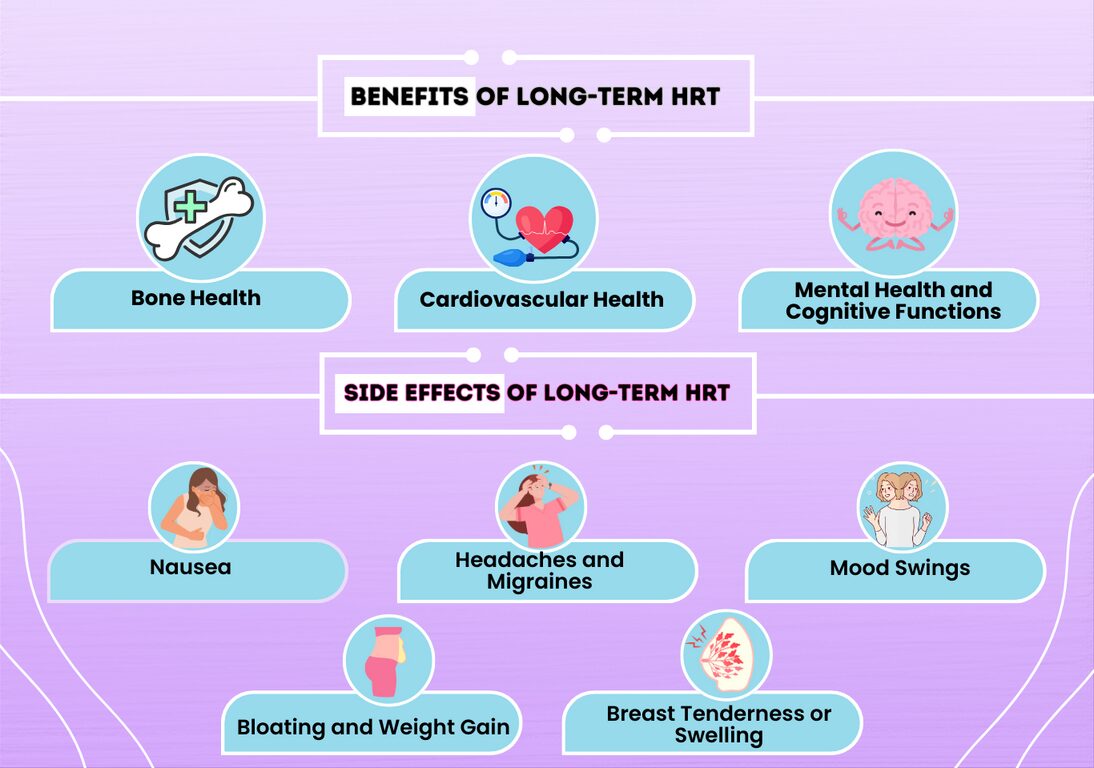
Benefits of Long-Term HRT
Using hormone replacement therapy (HRT) for many years can really help in a couple of big ways. Here’s how it can make a difference:
Symptom Relief and Quality of Life
Many people begin HRT for tough symptoms. They feel very hot suddenly, sweat at night, and their emotions change often. HRT can help calm these symptoms down. This means you could feel more comfortable, sleep better, and have more energy for your day. It’s like getting back a part of your life that you missed.
Long-Term Health Effects
1. Bone Health
After women go through menopause, their bones can get weaker quickly, which means they could break more easily. HRT helps slow down this bone loss and lowers the chance of breaking a bone. Medical professionals often suggest taking HRT for at least 5 years to really help your bones stay strong.
2. Cardiovascular Health
HRT can also be good for your heart and blood vessels. Studies have found that using estrogen after menopause can cut the risk of heart issues and strokes. This reduction ranges from 30 to 70%, even for those who already face health risks. Since heart disease is a big concern, this is a great reason to consider HRT.
3. Mental Health and Cognitive Functions
HRT might also help you stay in a good mood and keep your mind clear. A study found that HRT can lower the chance of feeling depressed during and after menopause. So, HRT isn’t just about your physical health; it’s also about helping you feel happy and think clearly.
Real-Life Story: Ann Newson
Ann Newson’s story shows how HRT can change lives. Over 30 years ago, she was struggling with feeling extremely tired and other symptoms that made her daily life hard. Starting HRT turned things around for her, giving her energy and happiness back. Ann now encourages other women to consider HRT if it could help them, too. Her advice is simple: if HRT is helping you, there’s no need to stop it quickly. It’s important to do what’s best for your body and not be afraid of using HRT if it’s making your life better.
To know more about Ann Newson’s story and her insights on HRT, you can listen to her podcast here. She shares her personal journey with HRT, offering valuable perspectives that could help many women make informed decisions about their health.
In short, being on HRT for a long time can not only help with menopause symptoms but also protect your health as you age. It’s about finding the right balance for you, but for many, HRT is a key part of staying healthy and happy.
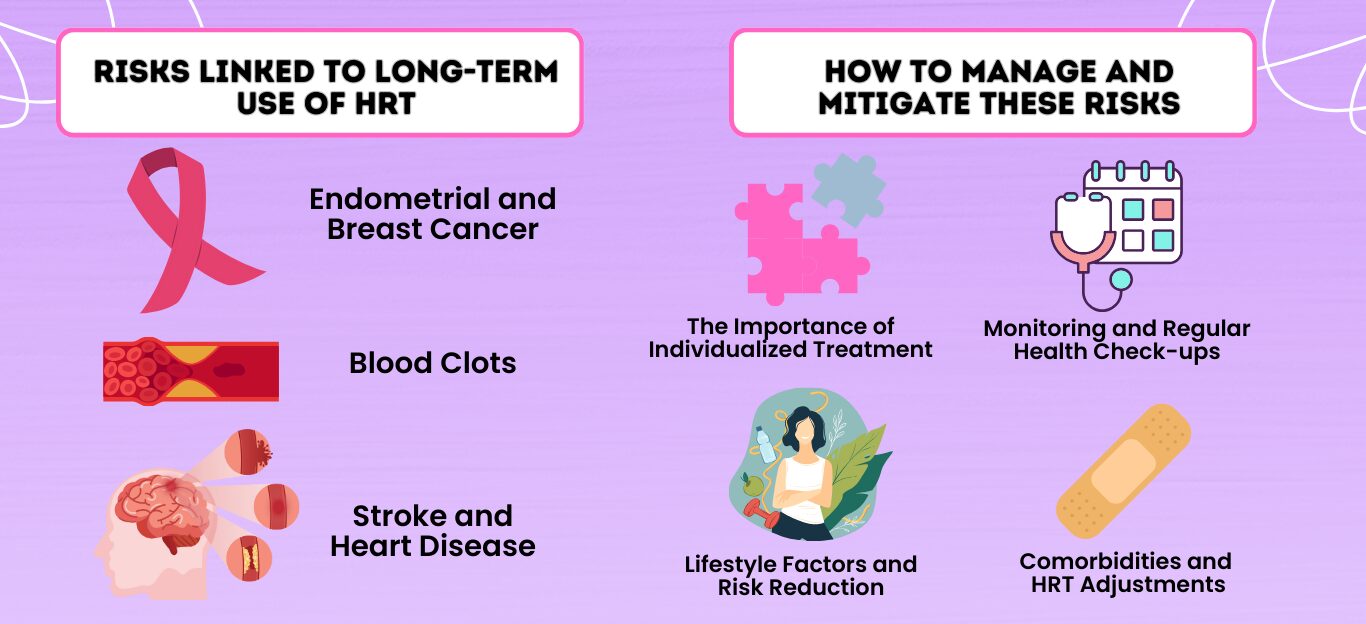
Potential Risks and Side Effects
Hormone replacement therapy (HRT) has many benefits, especially during menopause. But it’s also important to know about the possible risks and side effects, especially with long-term use.
Side Effects of HRT
When starting HRT, some people might experience side effects such as:
- Nausea: Feeling queasy, especially when you first start taking HRT.
- Headaches and Migraines: Some people notice their headaches get worse with HRT.
- Mood Swings: Your mood may go up and down a bit more than usual.
- Bloating and Weight Gain: Feeling more bloated or noticing a bit of weight gain on HRT is possible.
- Breast Tenderness or Swelling: Your breasts might feel tender or swollen at times.
These side effects often improve over time as your body gets used to the new hormone levels. If they don’t get better or if they’re really bothering you, it’s important to talk to your doctor. There might be different types of HRT you can try that could work better for you.
Risks Linked to Long-Term Use
Cancer Risks:
- Endometrial Cancer: If you use estrogen-only HRT and have your uterus, your risk of endometrial cancer goes up. Adding a hormone named progestogen during your cycle can reduce this risk. This combination helps keep your uterus healthy.
- Breast Cancer: There’s been a lot of research on HRT and breast cancer. The current understanding is that using HRT for 5 to 6 years doesn’t really increase your risk of getting breast cancer. But, if you use it for longer, like 10 to 15 years, the risk might go up a bit. Keep in mind, things like your family history and other breast conditions also play a role in your risk.
Other Considerations:
- Blood Clots: HRT can slightly increase the risk of developing blood clots. This risk is more common with certain types of HRT.
- Stroke and Heart Disease: The risk for stroke and heart disease goes up a little with HRT. This is more likely for older women or those who start HRT more than 10 years after menopause.
How to Manage and Mitigate these Risks
Deciding to start HRT means knowing its good points and possible risks. Here’s how you can reduce those risks:
1. The Importance of Individualized Treatment
Everyone’s body responds to HRT in its own way. Work with your healthcare provider to make a treatment plan just for you, based on your health needs and goals.
2. Monitoring and Regular Health Check-ups
Regular visits to your healthcare provider are key for safely using HRT. These visits let your healthcare provider check if the treatment works well and make changes if needed.
3. Lifestyle Factors and Risk Reduction
Adopting a healthy lifestyle can help minimize the risks associated with HRT. Eating well and exercising helps you stay healthy. Also, not smoking and drinking less alcohol are good for your health.
4. Comorbidities and HRT Adjustments
If you have other health conditions, it’s crucial to manage them alongside your HRT. Your treatment plan may need adjustments based on these conditions to ensure your overall health is protected.
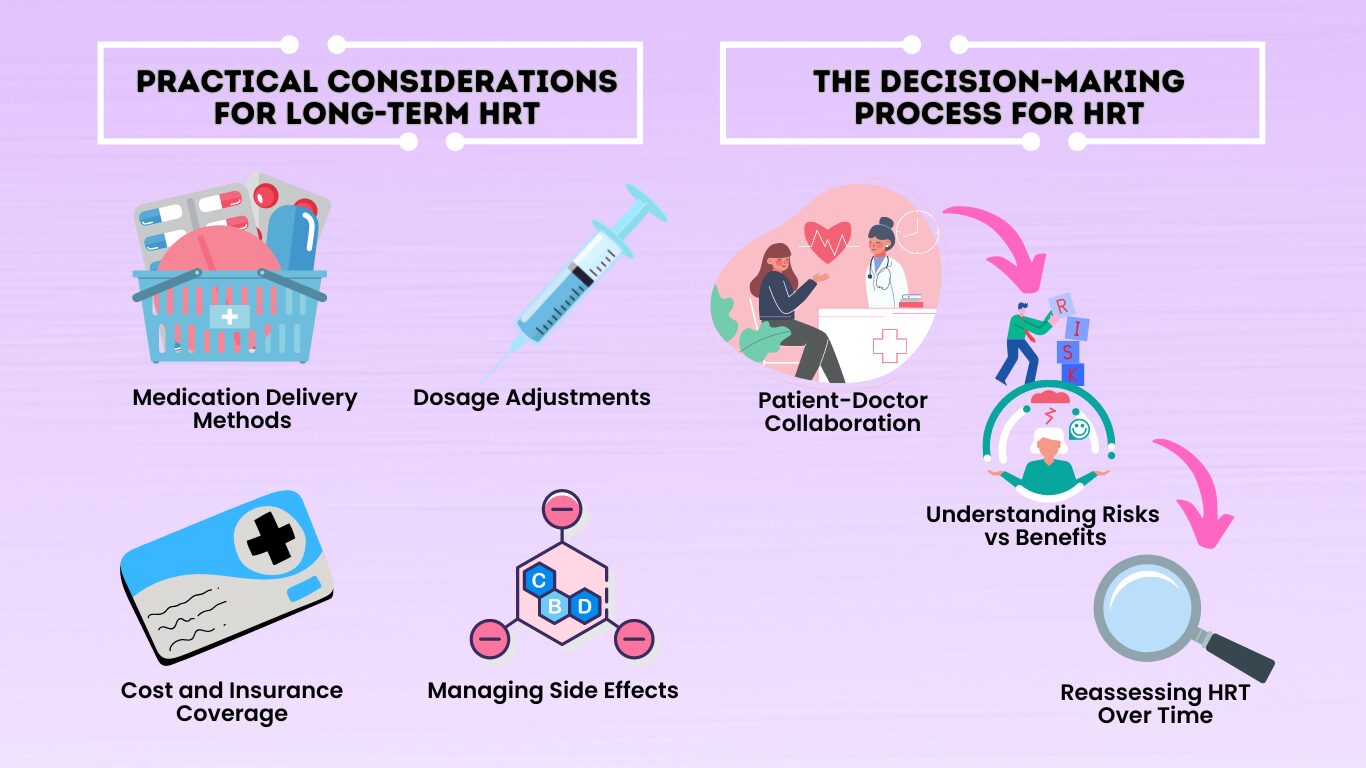
Practical Considerations for Long-Term HRT
Here are some important things to remember if you’re using hormone replacement therapy (HRT) for a while:
1. Medication Delivery Methods
You can take HRT in different forms like pills, patches you put on your skin, creams, or even shots. Your healthcare provider can help you pick the best way based on what’s easiest and best for you.
2. Dosage Adjustments
The amount of HRT you need might change as time goes on. It’s important to keep talking to your healthcare provider so they can adjust your dose. This helps make sure you get the right amount to help you feel good.
3. Managing Side Effects
Sometimes HRT can cause side effects like headaches or feeling queasy. If this happens, tell your healthcare provider. They can help figure out how to make these side effects better.
4. Cost and Insurance Coverage
The cost of HRT can be different for everyone, and what you pay might depend on your insurance. Check with your insurance to see what they cover. If you’re worried about the cost, talk to your healthcare provider. They might know some ways to help make it more affordable.
The Decision-Making Process for HRT
When thinking about hormone replacement therapy (HRT), here’s how to make the best decision:
1. Patient-Doctor Collaboration
Talking and making decisions with your doctor is key. Your doctor knows a lot about HRT, but how you feel and what you want is just as important. Working together helps make sure the HRT plan fits you just right.
2. Informed Consent and Understanding Risks vs Benefits
It’s important to know all about HRT before you start—what’s good about it and what risks there might be. Your doctor will tell you everything you need to know so you can decide if HRT is right for you. This is what we call “informed consent.”
3. Reassessing HRT Over Time
Once you start HRT, it’s not set in stone. You and your doctor will keep an eye on how it’s working and how you’re feeling. Over time, you might need to change the dose or even think about whether you want to keep taking HRT. It’s all about making sure it’s still the right choice for you as time goes on.
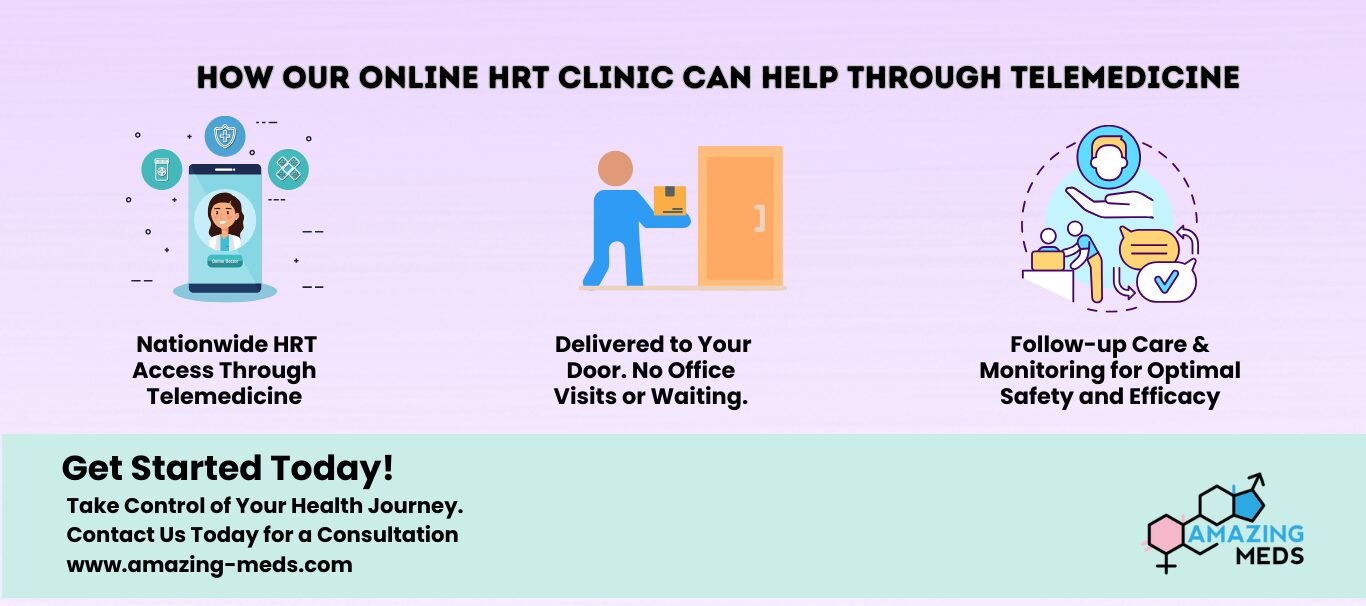
How Our Online HRT Clinic Can Help Through Telemedicine
Our telemedicine service makes getting hormone replacement therapy (HRT) easy. It brings personalized care right to your home.
Here’s how we support your journey:
1. Online Bioidentical HRT Prescription
Begin with an online chat with our medical team to talk about your symptoms and past health. If HRT fits your needs, we’ll give you bioidentical hormones made just for you. This helps balance your hormones in a natural and effective way.
2. Delivered to Your Doorstep via Telemedicine
Avoid waiting at the pharmacy with our delivery service. We’ll send your HRT medications right to your door for easy treatment.
3. Follow-Up Care & Monitoring for Long-Term Efficacy
Getting a prescription is just the start. We keep in touch online to tweak your treatment as needed, making sure you feel great at every step.
Frequently Asked Questions
Can I stop HRT at any point if I change my mind about lifelong treatment?
Yes, you can stop HRT if you decide it’s not right for you. Talk to your healthcare provider before stopping. They’ll help you do it safely. Stopping suddenly might bring back your old symptoms. Your healthcare provider can guide you on reducing the dosage gradually if needed.
Is it safe to stop HRT abruptly, or should it be tapered off?
It’s safer to taper off HRT slowly instead of stopping suddenly. Stopping HRT suddenly may cause discomfort and your symptoms to return. Your healthcare provider will create a plan for you to reduce your hormone dosage gradually, based on your situation.
What should I do if I experience side effects while on lifelong HRT?
If you experience side effects, tell your healthcare provider. They can adjust your treatment to reduce or get rid of these side effects. This may involve changing the dosage, switching to a different HRT form (like patches instead of pills), or addressing underlying issues causing side effects.
Is HRT covered by insurance for lifelong treatment, or is it considered elective?
Coverage varies by insurance and circumstances. Some plans cover it as necessary medical care, others may consider it elective. Check with your insurance provider to understand your insurance coverage for HRT. Your healthcare provider might provide documents or recommendations to support your case for coverage.
How often should I have hormone levels checked during lifelong HRT?
The frequency of checks depends on your treatment, medical history, and how you respond. Your healthcare provider will decide when to check. Typically, hormone levels are checked every three to six months at first, and less often later on. Regular checks ensure safe and effective treatment.
Can I switch between different HRT methods (e.g., pills, patches, injections) while on lifelong treatment?
Yes, you can switch methods if needed, with your healthcare provider’s help. They’ll consider your medical history, hormone levels, and any side effects. Switching should be guided by your healthcare provider to ensure safety and effectiveness.
Considering HRT? Contact Our Telehealth HRT Clinic
If you’re looking into hormone replacement therapy, we’re here to help. Our online clinic makes it easy to get the care you need. Get in touch today to begin feeling better.
Taking HRT for the Rest of Your Life – A Visual Summary

References
- Hillard TC, Whitcroft S, Ellerington MC, Whitehead MI. The long-term risks and benefits of hormone replacement therapy. J Clin Pharm Ther. 1991 Aug;16(4):231-45. doi: 10.1111/j.1365-2710.1991.tb00310.x. PMID: 1939402.
- Gordon JL, Rubinow DR, Eisenlohr-Moul TA, Xia K, Schmidt PJ, Girdler SS. Efficacy of Transdermal Estradiol and Micronized Progesterone in the Prevention of Depressive Symptoms in the Menopause Transition: A Randomized Clinical Trial. JAMA Psychiatry. 2018;75(2):149–157. doi:10.1001/jamapsychiatry.2017.3998




